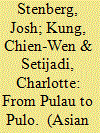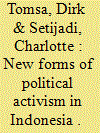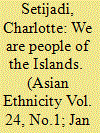|
|
|
Sort Order |
|
|
|
Items / Page
|
|
|
|
|
|
|
| Srl | Item |
| 1 |
ID:
149303


|
|
|
|
|
| Summary/Abstract |
In Indonesia, Chinese voluntary associations took on a new level of importance after the fall of Suharto’s New Order regime in 1998 that ushered in a revival of Chinese identity politics. At the same time, Sino-Indonesian relations are blossoming, and the rise of China as a global power means that Indonesia can only benefit from stronger ties with China in the future. In this new atmosphere of cooperation, I argue that Chinese Indonesian individuals and voluntary organizations play a crucial function as trade and cultural intermediaries. Drawing on both empirical and qualitative fieldwork data, in this paper, I examine how members of Chinese voluntary organizations view their ethnicity, national belonging, and strategic position in the contexts of post-Suharto Chinese identity politics and Sino-Indonesia relations. More broadly, this paper also offers a critical analysis of the internal dynamics of contemporary Overseas Chinese voluntary organizations and the role they play in building trade and sociocultural relationships between China and other countries.
|
|
|
|
|
|
|
|
|
|
|
|
|
|
|
|
| 2 |
ID:
191774


|
|
|
|
|
| Summary/Abstract |
Southeast Asia is an important region for working through questions of Chineseness. It is, however, a notoriously heterogeneous region, and conclusions derived from some parts of it can be of limited applicability elsewhere. This special issue offering empirically-grounded, multi-disciplinary research engages with and expands on existing scholarship on Southeast Asia’s Chinese. By focusing on Indonesia and the Philippines, the articles in this special issue investigate diverse models of being Chinese in Southeast Asia and depart from the familiar paradigms offered by Singapore and Malaysia, where ethnic Chinese populations are in the highest proportions and hold significant political power, and where Anglophone institutions transmute formulations of Chineseness into academic and political discourse. In so doing, we call for recognising diversity within Chinese communities in the region, not only among localised, hybrid expressions of Chineseness, but in the coexistence of both hybridity and persistent identification with Chineseness in multiple forms.
|
|
|
|
|
|
|
|
|
|
|
|
|
|
|
|
| 3 |
ID:
160431


|
|
|
|
|
| Summary/Abstract |
This article argues that new personality-centric movements have redefined the nexus between activism and electoral politics in Indonesia. It illustrates how these movements have challenged the role of political parties and consultants in electoral campaigning, and how their growing prominence may affect the future trajectory of Indonesian politics.
|
|
|
|
|
|
|
|
|
|
|
|
|
|
|
|
| 4 |
ID:
191781


|
|
|
|
|
| Summary/Abstract |
The Riau Islands Chinese are an anomaly in the study of Chinese Indonesians. For one, while many of their ethnic Chinese counterparts in other parts of Indonesia can no longer speak Chinese due to the New Order regime’s assimilation policy, Chinese languages are alive and well in the Riau Islands. Based on ethnographic fieldwork conducted in 2017–2018, this paper seeks to understand the Riau Islands Chinese’s cultural resilience and sense of belonging as a borderland ethnic minority. I argue that long-standing inter-Island and cross-border mobilities and cultural flows with Singapore have been central to the maintenance of Riau Islands Chinese identity. Utilising translocality as a theoretical framework to understand the processes of identity formation and place-making that transcend national borders, I contend that the case study of the Riau Islands Chinese challenges the conventional state-centric modes of analyses prevalent in the study of ethnic Chinese communities in Southeast Asia.
|
|
|
|
|
|
|
|
|
|
|
|
|
|
|
|
|
|
|
|
|